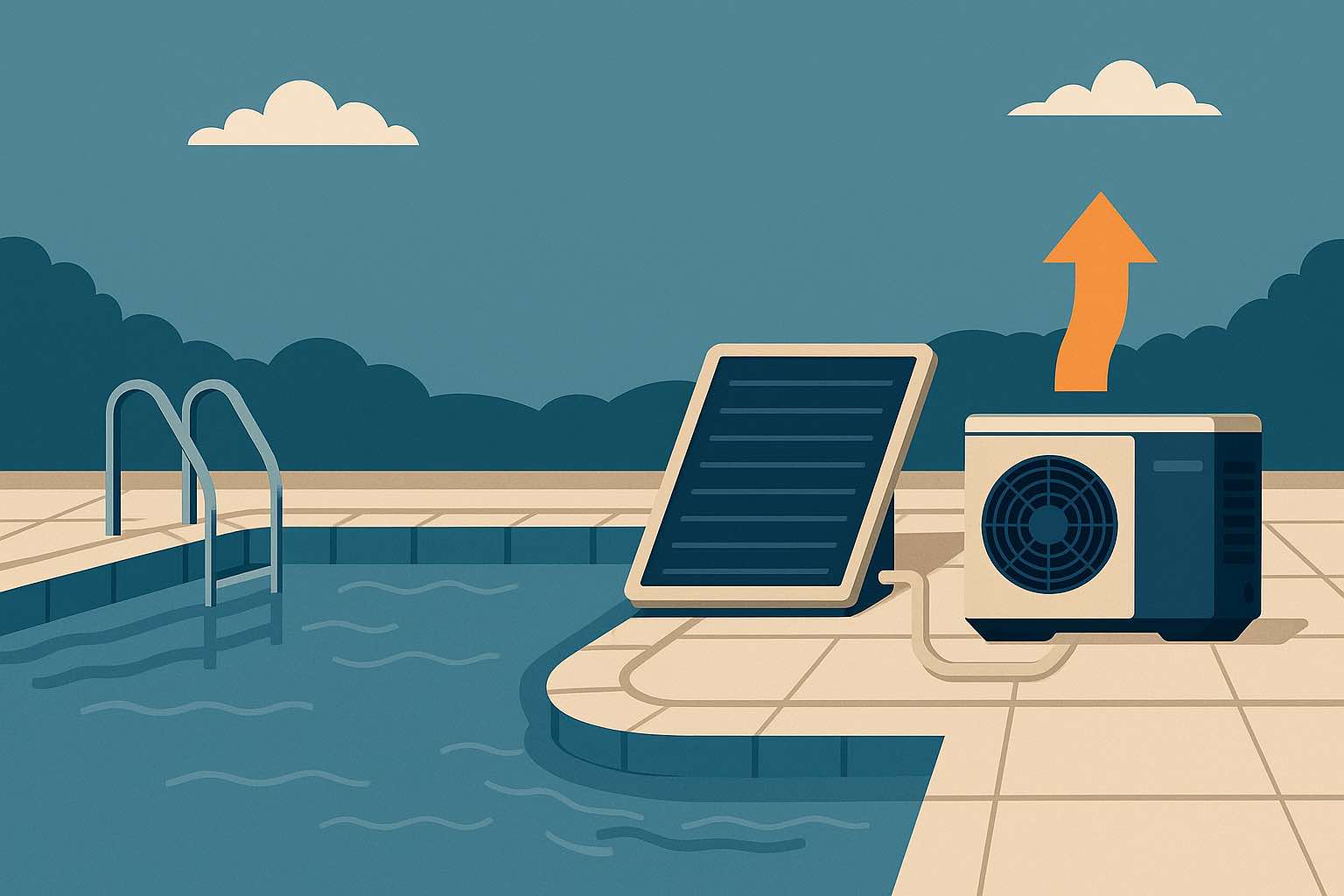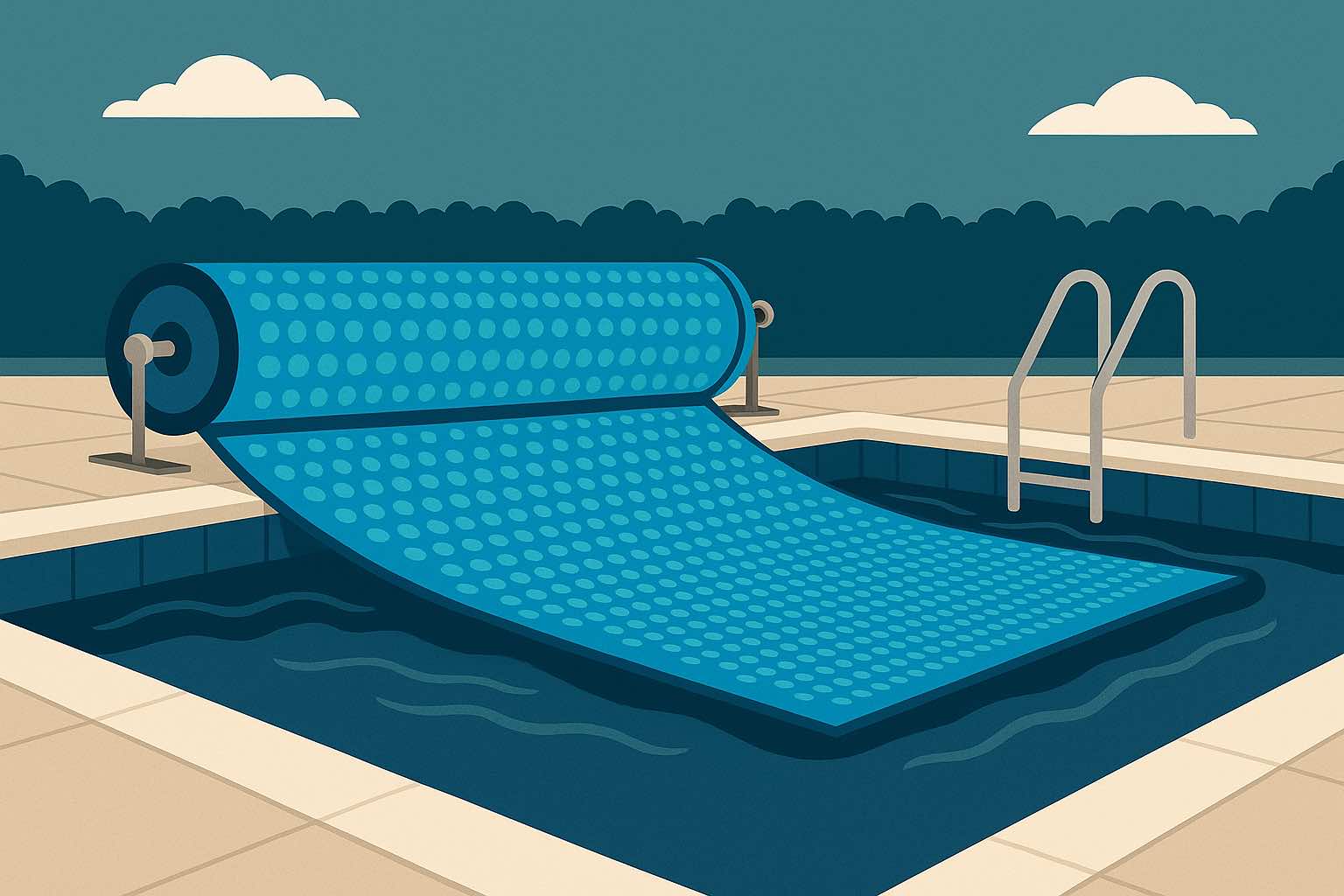
As the warm Australian sun begins to dip and the days grow shorter, many pool owners find themselves longing for a way to extend their swimming season. Enter pool heating; the key to transforming your backyard oasis from a seasonal luxury to a year-round retreat. Whether you’re in sun-soaked Queensland or chilly Tasmania, the right heating solution can make all the difference in how often you enjoy your pool.
Swimming Pool Heating Options
Solar Pool Heating
Solar pool heating harnesses the power of the sun to warm your pool water. The system typically consists of a solar collector – usually black tubes or panels mounted on your roof or a nearby structure. Pool water is circulated through these collectors, absorbing the sun’s heat before returning to your pool, gradually raising the water temperature.
Pros:
- Cost-effective to run, using free solar energy
- Environmentally friendly with no direct emissions
- Low maintenance and long lifespan (often 10+ years)
- Can heat pools quickly on sunny days
Cons:
- Dependent on weather conditions
- May require a larger roof area for collectors
- Less effective in consistently cloudy or cool climates
Cost-Effectiveness and Environmental Benefits
Solar pool heating stands out as one of the most economical options for warming your pool. After the initial installation cost, ongoing expenses are minimal, mainly just the electricity to run the circulation pump. This eco-friendly solution reduces your carbon footprint by utilising renewable energy, making it an attractive choice for environmentally conscious pool owners.
In many parts of Australia, a well-designed solar heating system can effectively warm your pool for 6 to 9 months of the year. For those in cooler regions of your year-round swimming, solar heating complemented with other heating methods can ensure consistent warmth, even on cloudy days.
Pool Heat Pumps
Operating pool heat pumps work similarly to reverse cycle air conditioners, extracting warmth from the surrounding air and transferring it to your pool water. This clever technology allows them to maintain a consistent water temperature regardless of weather conditions.
Pros:
- Consistent heating performance in various weather conditions
- Energy-efficient operation compared to gas heaters
- Suitable for year-round use
- Can be used for both heating and cooling
Cons:
- Higher upfront cost than some other options
- Slower to heat the pool initially
- Requires electricity to operate, impacting running costs
Energy Efficiency and Running Costs
While heat pumps use electricity to operate, they’re surprisingly efficient. For every unit of electricity consumed, they can generate up to five units of heat energy. This efficiency translates to lower running costs compared to gas heaters, with potential savings of up to 70%. However, the actual costs will depend on local electricity prices and usage patterns.
Modern inverter heat pumps use technology to take efficiency a step further. These smart-systems adjust their operating speed based on the heating requirements. Once your pool reaches the desired temperature, the pump slows down to maintain it, rather than cycling on and off at full power, reducing energy consumption and lowering operating noise.
For pool owners seeking a balance between consistent heating and energy efficiency, inverter heat pumps offer an attractive solution.
Gas Pool Heaters
Gas pool heaters are the powerhouses of pool warming, offering rapid heating through a straightforward process. As pool water circulates through a series of copper tubes, gas is ignited to heat these tubes. The water quickly absorbs this heat before returning to the pool, rapidly raising the overall temperature.
Pros:
- Fast heating capability
- Effective in any climate
- Provides precise temperature control
- Heats to higher temperatures than other methods
Cons:
- Higher running costs, especially with fluctuating gas prices
- Less environmentally friendly due to fossil fuel use
- More frequent maintenance may be required
Cost Considerations
While gas heaters can heat your pool quickly, this convenience comes at a price. Running costs are typically higher than other heating methods, especially with the volatility of gas prices.
It’s worth noting that while the initial installation cost of a gas heater may be lower than some alternatives, potential repair costs can be significant. The copper heat exchangers are particularly susceptible to damage from poor water balance and high chlorine levels.
For pool owners prioritising quick heating and precise temperature control over long-term running costs, gas heaters remain a viable option.
Pool Covers
Types and Benefits
Pool covers, particularly solar covers, are an essential component of any efficient pool heating system. These covers, often made from polyethylene with a bubble layer, serve a dual purpose. They not only capture and transfer solar energy to warm your pool water but also act as a barrier to reduce evaporation and heat loss.
Heat Retention and Evaporation Reduction
A quality pool cover can significantly impact your pool’s temperature and water retention. On sunny days, a solar cover can increase your pool’s temperature by up to 8°C. More importantly, covers can reduce evaporation by up to 95%, potentially saving over 10,000 litres of water per month.
Complementary To Other Heating Methods
While pool covers are effective on their own, they truly shine when used in conjunction with other heating methods. By retaining heat and reducing evaporation, covers can enhance the efficiency of solar heating systems, heat pumps, and gas heaters alike. This complementary approach can reduce your overall heating costs by up to 50%, making a pool cover a smart investment for any pool owner looking to optimise their pool heating.
Factors to Consider When Choosing a Pool Heater
Desired Swimming Season Length
Consider how long you want to use your pool each year. If you’re content with swimming during the warmer months and shoulder seasons, a solar heating system might suffice. For year-round swimming, a heat pump or gas heater could be more appropriate. Weather in your location will also play a role in this.
Pool Size and Location
The size of your pool directly impacts the heating requirements. Larger pools need more powerful heating systems to maintain comfortable temperatures. Additionally, your pool’s exposure to sun and wind affects heat retention. A sheltered pool might benefit more from solar heating, while a wind-exposed pool might require a more consistent heat source like a heat pump.
Initial Installation Costs
Upfront costs vary significantly between heating options. Solar heating systems and pool covers generally have lower initial costs, while heat pumps and gas heaters require a larger investment.
Ongoing Operating Expenses
Consider the day-to-day costs of running your chosen heating system using the information detailed in this guide.
Energy Efficiency and Environmental Impact
For environmentally-conscious pool owners, the ecological footprint of your heating system is an important consideration. Solar heating and pool covers have the lowest environmental impact. Heat pumps offer a good balance of efficiency and performance. Gas heaters, while effective, have the highest environmental impact due to their reliance on fossil fuels.
Choosing the Right Pool Heating Solution
Choosing the right pool heating solution is crucial for maximising your enjoyment of your swimming pool throughout the year. Whether you opt for eco-friendly and cost-effective solar heating, the consistent performance of a heat pump, the rapid heating of a gas system, or the simple efficiency of a pool cover, each option has its merits. The best choice for you will depend on your specific circumstances, including your location, budget, and swimming habits.
Combining different heating methods, such as using a pool cover alongside another heating system, can often provide the most efficient and cost-effective solution. This approach allows you to harness the benefits of multiple technologies while mitigating their drawbacks.
For personalised advice on the best pool heating solution for your unique situation, we recommend consulting with a pool professional. Contact us to find out more about our pool heating solutions.



